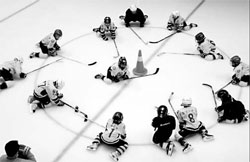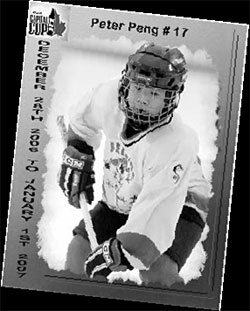The Mighty Peking Ducks
Little Heroes, a team of child hockey players (above and below), during the regular training on Saturday night at the LeCool Ice Rink. |
Back in the rest area, a dozen boys aged between 8 and 12 couldn't wait to hit the on ice. They prepared with high spirits for the weekly hockey training from 10pm to 11:30 pm, when many of their peers have tucked up in bed.
"I don't feel sleepy at all. I've been looking forward to the class all week," said Hu Xiaoyang, 9. His teammates, who were warming up, agreed. Some were wielding the sticks to hit an imaginary puck. Others shared snacks and anecdotes of their great moments with their parents.
Hu pulled out a set of protective equipment from an enormous bag, which probably could have carried him. He put on shin guards, elbow pads, shoulder pads, gloves and helmet all by himself like a professional. But he needed the coach to help with the skates.
enormous bag, which probably could have carried him. He put on shin guards, elbow pads, shoulder pads, gloves and helmet all by himself like a professional. But he needed the coach to help with the skates.
"They are still kids. They don't have enough strength to tighten the shoelaces," said Zhang Dongdong, coach of Hu's team, the Little Heroes.
A former ice hockey athlete, Zhang won three national championships representing Qiqiha'er of Northeast China's Heilongjiang Province. He retired from the national team last September and now studies at the Beijing University of Physical Education. He works as a part-time coach at the rink.
"I started the strict discipline for a professional hockey player when I was a little boy, just like them. It is difficult to give it up totally," he said as he looked at the enthusiastic youngsters queuing in line and dragging their sticks into the rink.
Peng Tianyao represents the Beijing Dragons at the 2007 Bell Capital Cup in Ottawa, Canada. |
The following class would include an hour's skill training and 30 minutes counter strikes, in which they would be divided into three teams. Whoever scored a goal would win the match, and the losing team would make way for the other team on the sidelines.
Ice hockey is said to have emerged in China about 60 years ago. Today, ice stadiums have enabled more people, particularly from areas with little snow, to enjoy the excitement of ice sports. But ice hockey is far less popular among Chinese than table tennis or badminton.
The sport is considered too professional for ordinary people and its aggressiveness, technical nature and high cost equipment restricts its widespread popularity.
However, an ice hockey trend is emerging in major cities and children from well-off families are enthusiastically gripping the sport, like their hockey sticks, with both hands.
Hockey courses for children and amateur competitions between clubs are on offer at qualified ice rinks.
Zhang said Beijing is leading the way and has at least 10 amateur children hockey teams. The Little Heroes he now coaches was founded in 2004, the earliest among the three children teams organized by LeCool Ice Rink. The other two are the Northern Lights and the Wolf Pups.
Team trainings are arranged late on Friday and Saturday nights and early Sunday morning, after and before business hours. Individual classes are available for children who need extra skill training on ice before they join the team.
Eight-year-old An Shiwen has just finished the individual course and started the trial training in the Little Heroes.
Grabbing a stick, which matched his own height, he tried his very best to keep balance as he strode, controlled the puck and scored. Hu Zhiping, the mother, fixed her eyes on her son. She gasped and rose to her feet.
Her precious little boy had just been bowled over by another player and bumped onto the hard boards with a terrifying bang.
Mother Hu was scared stiff but she didn't pull her son out of the rink. She sat down again as the boy shook his head, saying: "I'm OK mom."
Like many of his teammates, An was attracted to the rink after he saw children playing hockey at LeCool.
"He can play with other children and make good friends here," his mother said. "It is a pity that today's children are burdened with too much homework and do not have enough leisure time, even on weekends."
"We fully respect his hobbies. Hockey playing does benefit him a lot in the long term. He will know what the cohesion means for a team," she said.
Last December, five Chinese teams from Beijing and Harbin, capital of Heilongjiang, participated in the Bell Capital Cup, a well-known children's ice hockey competition for both professionals and amateurs annually held in Ottawa, Canada.
It was the second time China took part in the game and so did Peng Tianyao.
The fifth-grader became fascinated with the sport during a visit to the ice rink, where several foreign children from international schools were playing hockey under the instruction of their parents.
He started the training at six and joined the Beijing Dragons in 2005, a private children hockey club set up by parents whose children play regularly.
Peng's team played in last year's Bell Capital Cup. They ranked last in the group and did not enter the next round.
"It is still a long way for China to catch up with strong opponents in Europe and North America," said Yao Junying, Tianyao's mother. "We just hope the children can display their best in every match and learn something."
She said because of increasing studying pressure, many children in the team will quit after entering the middle school. But she hopes that Peng can keep practicing hockey and develop it into a lifetime hobby.
"Children spend too much time before a television or computer these days. They need something that can build up their bodies and temper their willpower. Hockey playing is surely a good method," she said.
Even girls have also started to play the game.
"We have two girl players. It is interesting that they look as cute as other girls outside the rink. Yet when they get back to the game, they perform as diligent and skilfully as boys," Yao said.
Despite its growing popularity, hockey is still an unaffordable hobby for the average Chinese family. Hockey equipment will scare away many as a full kit can reach 8,000 yuan ($1,030) and sometimes more than 10,000 yuan ($1,290) for imported equipment. Parents also pay for touring competitions both at home and abroad themselves.
Both Yao and Zhang call for more social attention to the development of China's hockey playing.
(China Daily 04/12/2007 page20)
















